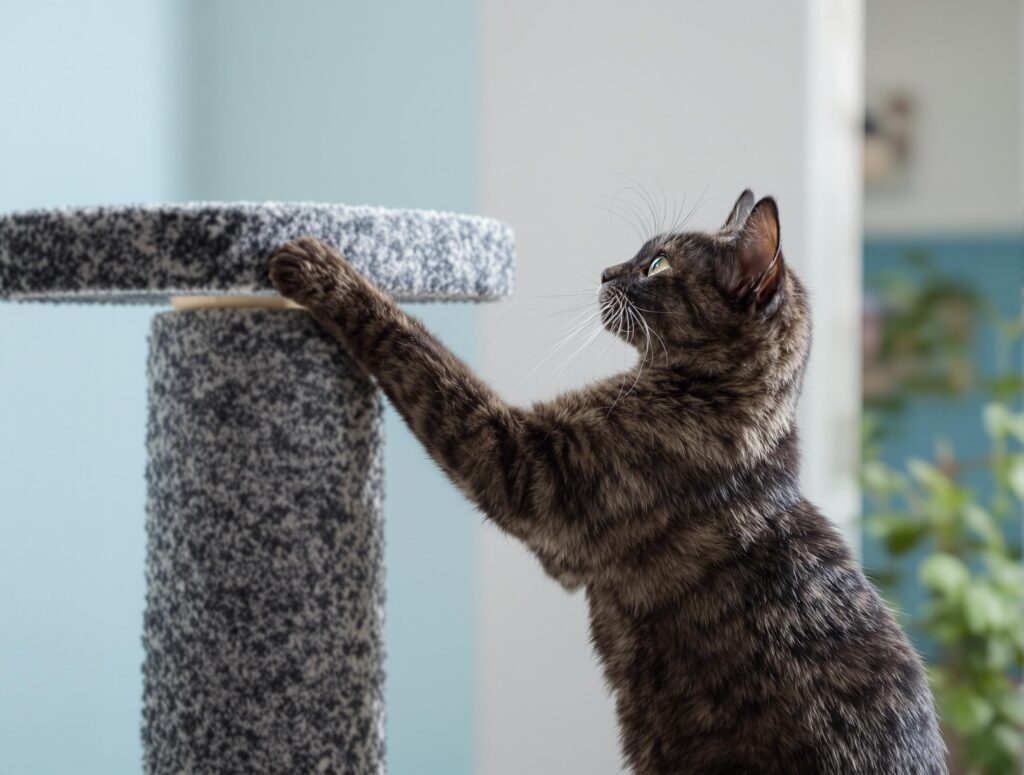Why Does My Cat Need Flea & Tick Prevention: A Guide for Concerned Pet Owners

Key Takeaways
- Cats require year-round flea and tick prevention to avoid health risks like flea allergic dermatitis and tick-borne diseases.
- Consistent use of veterinary-approved preventatives offers reliable protection, backed by research, to ensure your cat’s health and comfort.
- Working with veterinary professionals helps tailor a prevention plan to your cat’s unique lifestyle and medical history, ensuring effective care.
Did you know that only 1–5% of the fleas on your cat are actually visible? The other 95% are hiding in plain sight—lingering as eggs, larvae, and pupae throughout your home. This means that even if you don’t see fleas on your cat, an infestation could still be thriving in your carpets, furniture, and bedding.
When it comes to flea and tick treatments, a one-size-fits-all approach doesn’t work. Every cat is unique, and what works for one pet might not be safe or effective for another. Certain flea treatments designed for dogs can even be toxic to cats. That’s why working with a veterinarian is essential. They can help you navigate the wide range of options and find a solution tailored to your cat’s age, weight, health status, and lifestyle.
At PetHealthMD, we’re committed to helping pet owners make informed decisions about their cat’s health. Whether you’re dealing with an active flea problem or looking for the best preventative treatment, we’re here to guide you every step of the way.
Why Is Flea and Tick Prevention Important for Cats?
Fleas and ticks may seem like a minor inconvenience, but they can lead to serious health problems for your cat. These tiny parasites cause itching, allergic reactions, and even life-threatening diseases. Consistent prevention is key to keeping your cat comfortable, healthy, and safe from harm.
How Fleas Affect Your Cat
If your cat has ever had fleas, you know how frustrating they can be. But beyond the itching and irritation, fleas can lead to more serious health problems, including:
- Flea Allergy Dermatitis (FAD): Some cats have an extreme allergic reaction to flea saliva, causing severe itching, redness, hair loss, and painful skin infections.
- Skin Infections: Scratching at flea bites can break the skin, leading to bacterial infections, scabs, and inflammation.
- Anemia: A severe flea infestation can drain so much blood that kittens and older cats may become weak, lethargic, and even require emergency care.
- Tapeworms: Cats can ingest infected fleas while grooming, leading to a tapeworm infestation that causes weight loss and digestive issues.
How Ticks Affect Your Cat
Ticks can transmit dangerous diseases that impact your cat’s long-term health, including:
- Lyme Disease: Though rare in cats, it can cause joint pain, fever, and lethargy.
- Anaplasmosis: A bacterial infection leading to fever, swollen joints, and loss of appetite.
- Bartonellosis (Cat Scratch Fever): Carried by both fleas and ticks, this infection can cause fever, swollen lymph nodes, and chronic inflammation.
- Rocky Mountain Spotted Fever: A potentially deadly disease that can lead to fever, muscle pain, and neurological issues.
- Babesiosis: A parasite that infects red blood cells, causing anemia, weakness, and fatigue.
Explore cat flea and tick prevention products to help protect your pet year-round.

Over-the-Counter vs. Prescription Flea and Tick Medicine
With so many options available, it can be overwhelming to decide between over-the-counter (OTC) and prescription flea and tick treatments. Each has its advantages.
Over-the-Counter (OTC) Flea and Tick Medicine
- Convenient and easily available online or in stores without a prescription.
- Often more affordable than prescription treatments.
- Offered in several forms, such as collars, sprays, topicals, and shampoos.
- May provide short-term relief for mild infestations or supplement household control.
Prescription Flea and Tick Medicine
- Contains stronger, veterinarian-approved ingredients that eliminate fleas and ticks efficiently.
- Offers long-lasting protection, often for 30–90 days per dose.
- Customized by a vet based on your cat’s weight, health, and lifestyle.
- Some also protect against mites, heartworms, and intestinal parasites.
Talk to your veterinarian to determine which option is best for your cat. You can also browse prescription flea and tick medications for cats for trusted options.
Addressing Common Misconceptions About Cat Flea and Tick Treatments
Are Indoor Cats Really Safe from Fleas and Ticks?
Even indoor cats are at risk. Fleas and ticks can enter on shoes, clothing, other pets, or through open windows. Consistent indoor prevention is still necessary.
Are Natural Remedies Safer?
Most natural remedies lack scientific proof and may not provide reliable protection. Veterinary-approved treatments undergo safety testing and offer proven results.
Should I Only Treat During Flea and Tick Season?
No. Fleas and ticks can survive year-round, especially indoors. Consistent prevention is essential even in winter.
Can a Single Treatment Eliminate Fleas?
Unfortunately not. Flea eggs, larvae, and pupae can survive in your home for weeks or months. Ongoing treatment and cleaning are needed to fully eliminate them.
Are Flea and Tick Preventatives Dangerous?
When used correctly, veterinary-approved preventatives are extremely safe. Always follow dosage instructions and ask your vet if you have concerns.
Protect Your Cat from Fleas and Ticks Today
Protecting your cat from fleas and ticks is one of the most important steps you can take for their health and comfort. Consistent prevention keeps your cat itch-free and helps you avoid costly vet visits.
For trusted, vet-approved products, visit the Flea and Tick Treatments for Cats section at 1800PetMeds. Enjoy peace of mind knowing your cat is protected with safe, effective, year-round care.





